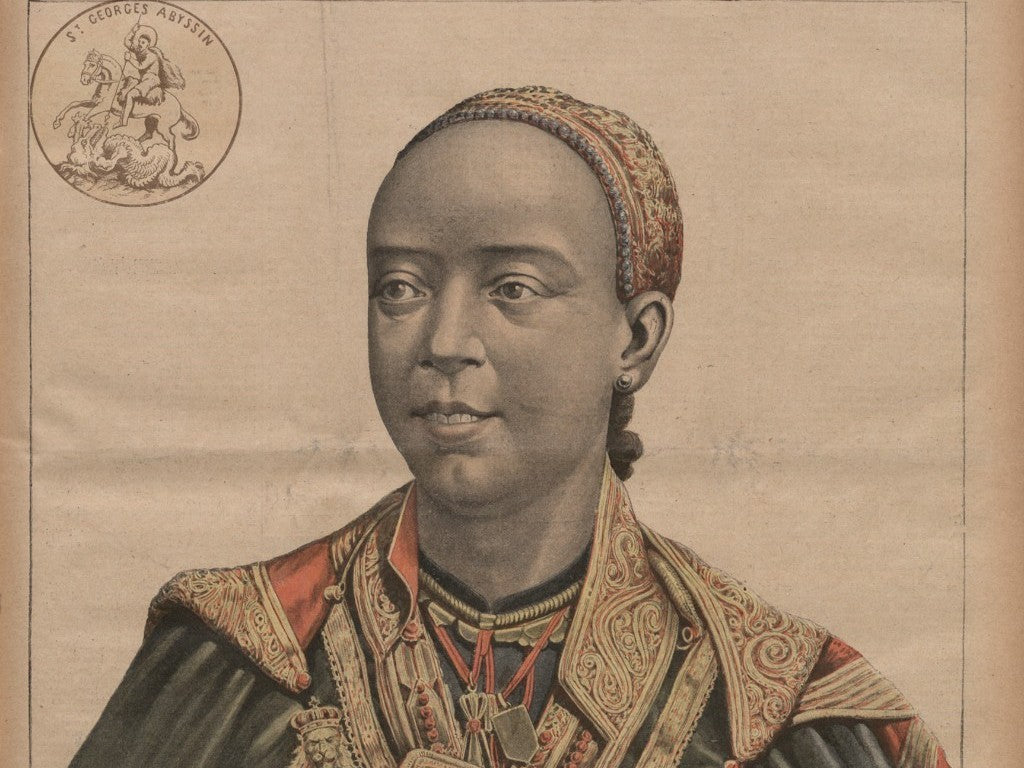
Born in Simien province to an aristocratic Ethiopian family of Oromo heritage, Taytu Beytul claimed descent from the Solomonic dynasty. The Oromo are the largest Cushitic ethnic group native to the Oromia region of Ethiopia and parts of Northern Kenya. They speak Oromo, historically also called Galla.
Her father was a warrior named Ras Betul Haile Maryam. He was a member of the Simien province's ruling family and a direct descendant of Emperor Susenyos I. Her mother's name was Yewubdar, and she came from a Gondar noble family. Her great-grandfather, Ras Gebre of Simien, ruled for 44 years during the period known as the Zemene Mesafint, or the "Era of the Princes".
There were no family name in Ethiopia. Descendants would attach the first name of their father to their name.
Growing up, she was taught to read and write in Amharic and Ge'ez, a rarity, considering that during this time period it was unlikely for women to be educated.
Taytu married Emperor Menelik II, in 1883 and wielded considerable political power as the wife of the Emperor and is perhaps most famous for her strength during the Battle of Adwa where a large Italian colonial force was defeated. Their union bestowed upon her the title of Empress of Ethiopia.
In 1889, Emperor Menelik II signed a treaty of amity with Italy, dubbed the Treaty of Wuchale. Unbeknownst to Menelik, Article 17 of the Italian version of the treaty obligated Ethiopia to go through the Italian government in all of its foreign policy dealings, a distortion of the Amharic version, which simply allowed for the option of seeking Italian diplomatic support.
The 1889 Treaty of Wichale Treaty was in fact a deliberate attempt by the Italian government to dupe Ethiopia into becoming an Italian protectorate.
When Taytu discovered this, she became enraged and tore the treaty in half. Italy had already colonized neighboring Eritrea and the majority of Somalia, but she convinced the emperor to declare war on Italian aggression when it attempted to colonize Ethiopia.
As tension mounted, the empress persuaded the emperor to declare war against Italy. This culminated in the 1896 Battle of Adwa, the climactic battle of the First Italo-Ethiopian War. The Ethiopian forces defeated the Italian invading force on Sunday 1 March 1896, near the town of Adwa. The decisive victory thwarted the campaign of the Kingdom of Italy to expand its colonial empire in the Horn of Africa. The Battle of Adwa was the most significant victory of any African army during the climax of European colonialism.
The Treaty of Addis Ababa, signed in October 1896, repealed the Treaty of Wichale. The Italian claim to a protectorate over all of Ethiopia was thereafter abandoned.
By the end of the 19th century, European powers had carved up almost all of Africa after the Berlin Conference; only Ethiopia and Liberia still maintained their independence.
Empress Taytu Beytul founded Addis Ababa, which remains Ethiopia’s capital city today, and the final decades of her reign witnessed a period of modernization, which gradually opened Ethiopia up to trade.
She built St. Mary's church at Entoto, characterized by its octagonal domes. Founded on the Entoto Hills, St. Mary's church is the oldest church in Ethiopia, and the burial places of Menelik II and Taytu in a tomb called "Shera Bet" built in 1918.
---
Like this post? Stop by and read ”Axumite Queen Makeda: The Queen of Sheba." Makeda, Queen of Sheba, ruled the Axumite kingdom for more than 50 years. She traveled to Jerusalem to witness the fabled wisdom of King Solomon and bore him a son named Menelik, the first Imperial ruler of Ethiopia.
I'd love to have you as a customer, head to the online store and shop for handcrafted beaded jewelry by beYOUteous.
Leave a comment